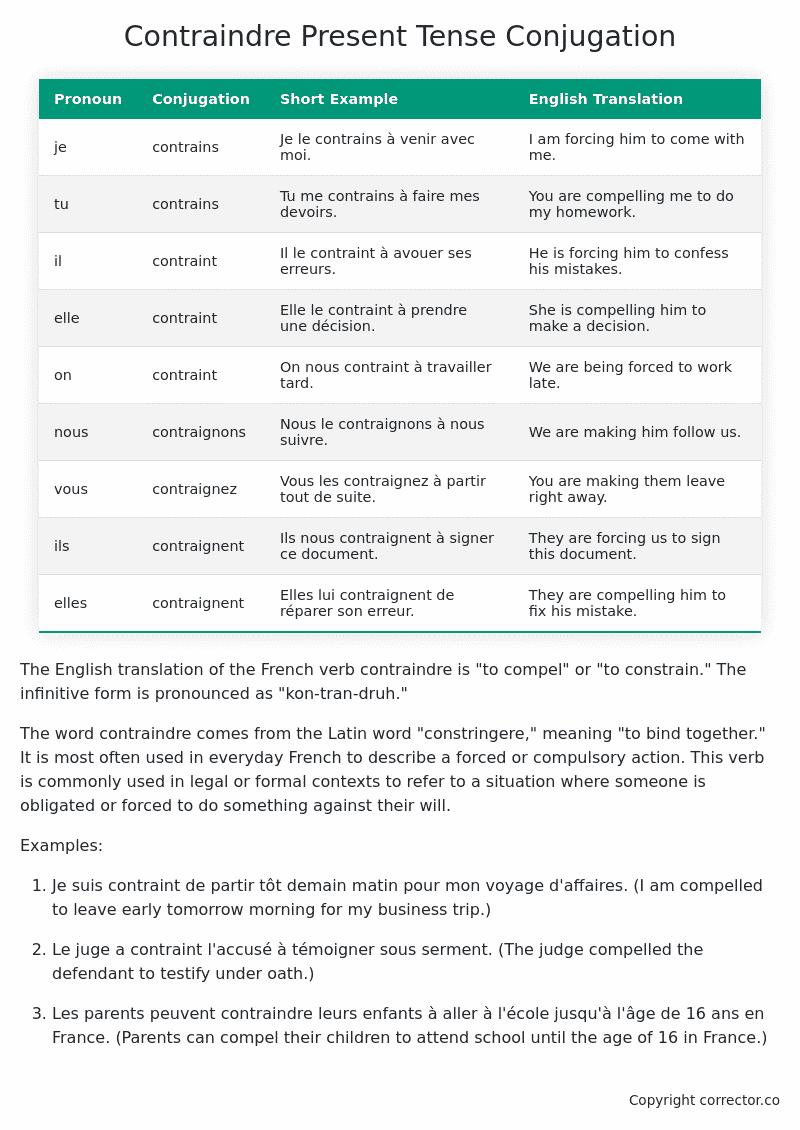Le Present (Present Tense) Conjugation of the French Verb contraindre
Introduction to the verb contraindre
The English translation of the French verb contraindre is “to compel” or “to constrain.” The infinitive form is pronounced as “kon-tran-druh.”
The word contraindre comes from the Latin word “constringere,” meaning “to bind together.” It is most often used in everyday French to describe a forced or compulsory action. This verb is commonly used in legal or formal contexts to refer to a situation where someone is obligated or forced to do something against their will.
Examples:
-
Je suis contraint de partir tôt demain matin pour mon voyage d’affaires. (I am compelled to leave early tomorrow morning for my business trip.)
-
Le juge a contraint l’accusé à témoigner sous serment. (The judge compelled the defendant to testify under oath.)
-
Les parents peuvent contraindre leurs enfants à aller à l’école jusqu’à l’âge de 16 ans en France. (Parents can compel their children to attend school until the age of 16 in France.)
Contraindre – About the French Present Tense
To take a deep dive into all the French tenses then see our article on Mastering French Tense Conjugation.
Common Everyday Usage Patterns For Le Present
Interactions with Other Tenses
Table of the Present Tense Conjugation of contraindre
| Pronoun | Conjugation | Short Example | English Translation |
|---|---|---|---|
| je | contrains | Je le contrains à venir avec moi. | I am forcing him to come with me. |
| tu | contrains | Tu me contrains à faire mes devoirs. | You are compelling me to do my homework. |
| il | contraint | Il le contraint à avouer ses erreurs. | He is forcing him to confess his mistakes. |
| elle | contraint | Elle le contraint à prendre une décision. | She is compelling him to make a decision. |
| on | contraint | On nous contraint à travailler tard. | We are being forced to work late. |
| nous | contraignons | Nous le contraignons à nous suivre. | We are making him follow us. |
| vous | contraignez | Vous les contraignez à partir tout de suite. | You are making them leave right away. |
| ils | contraignent | Ils nous contraignent à signer ce document. | They are forcing us to sign this document. |
| elles | contraignent | Elles lui contraignent de réparer son erreur. | They are compelling him to fix his mistake. |
Other Conjugations for Contraindre.
Le Present (Present Tense) Conjugation of the French Verb contraindre (this article)
Imparfait (Imperfect) Tense Conjugation of the French Verb contraindre
Passé Simple (Simple Past) Tense Conjugation of the French Verb contraindre
Passé Composé (Present Perfect) Tense Conjugation of the French Verb contraindre
Futur Simple (Simple Future) Tense Conjugation of the French Verb contraindre
Futur Proche (Near Future) Tense Conjugation of the French Verb contraindre
Plus-que-parfait (Pluperfect) Tense Conjugation of the French Verb contraindre
Passé Antérieur (Past Anterior) Tense Conjugation of the French Verb contraindre
Futur Antérieur (Future Anterior) Tense Conjugation of the French Verb contraindre
Subjonctif Présent (Subjunctive Present) Tense Conjugation of the French Verb contraindre
Subjonctif Passé (Subjunctive Past) Tense Conjugation of the French Verb contraindre
Subjonctif Imparfait (Subjunctive Imperfect) Tense Conjugation of the French Verb contraindre
Conditionnel Présent (Conditional Present) Tense Conjugation of the French Verb contraindre
Conditionnel Passé (Conditional Past) Tense Conjugation of the French Verb contraindre
L’impératif Présent (Imperative Present) Tense Conjugation of the French Verb contraindre
L’infinitif Présent (Infinitive Present) Tense Conjugation of the French Verb contraindre
Struggling with French verbs or the language in general? Why not use our free French Grammar Checker – no registration required!
Get a FREE Download Study Sheet of this Conjugation 🔥
Simply right click the image below, click “save image” and get your free reference for the contraindre Present Tense tense conjugation!

I hope you enjoyed this article on the verb contraindre. Still in a learning mood? Check out another TOTALLY random French verb present conjugation!


